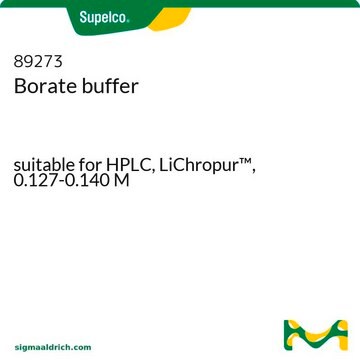B6768
Boric acid
BioReagent, for molecular biology, suitable for cell culture, suitable for plant cell culture, ≥99.5%
About This Item
Recommended Products
grade
for molecular biology
Quality Level
vapor pressure
2.6 mmHg ( 20 °C)
product line
BioReagent
Assay
≥99.5%
form
powder
technique(s)
cell culture | mammalian: suitable
cell culture | plant: suitable
pH
5.1 (25 °C, 1.8 g/L)
mp
160 °C (dec.) (lit.)
solubility
water: 40 mg/mL, clear, colorless
density
1.49 g/cm3 at 23 °C
cation traces
Fe: ≤5 ppm
Mg: ≤5 ppm
heavy metals (as Pb): ≤10 ppm
UV absorption
λ: 260 nm Amax: 0.05
λ: 280 nm Amax: 0.05
foreign activity
DNase, RNase, and protease, none detected
storage temp.
room temp
SMILES string
OB(O)O
InChI
1S/BH3O3/c2-1(3)4/h2-4H
InChI key
KGBXLFKZBHKPEV-UHFFFAOYSA-N
Looking for similar products? Visit Product Comparison Guide
General description
Application
- to prepare boric buffer for the quantification of primary amine groups at the surface of nanocapsules
- to study its effects on epigenetic change
- for the estimation of protein in wheatgrass using Kjeldahl method
Intensified Azeotropic Distillation: A Strategy for Optimizing Direct Amidation
Features and Benefits
- Environment-friendly
- Non-toxic
Signal Word
Danger
Hazard Statements
Precautionary Statements
Hazard Classifications
Repr. 1B
Storage Class Code
6.1C - Combustible acute toxic Cat.3 / toxic compounds or compounds which causing chronic effects
WGK
WGK 1
Flash Point(F)
Not applicable
Flash Point(C)
Not applicable
Personal Protective Equipment
Regulatory Listings
Regulatory Listings are mainly provided for chemical products. Only limited information can be provided here for non-chemical products. No entry means none of the components are listed. It is the user’s obligation to ensure the safe and legal use of the product.
EU REACH SVHC Candidate List
EU REACH Annex XVII (Restriction List)
Choose from one of the most recent versions:
Already Own This Product?
Find documentation for the products that you have recently purchased in the Document Library.
Customers Also Viewed
Our team of scientists has experience in all areas of research including Life Science, Material Science, Chemical Synthesis, Chromatography, Analytical and many others.
Contact Technical Service








